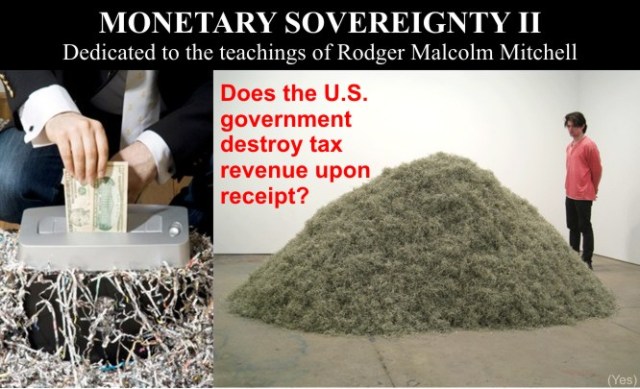
Reader “Smerls” says some aspects of MMT are simply unbelievable, because MMT people have never proven them.
(However “Smerls” believes politicians who claim, for example, that Social Security is “insolvent,” even though politicians have never proven this claim. Politicians can’t provide any proof, since it is a lie. Politicians spout this lie in order to make you grovel before them, and to legitimize the ever-widening Gap between the rich and the rest.)
I appreciate “Smerls’” frustration. Most MMT writers are unreadable. Worse, some of their claims are flat wrong. For example, most MMT people claim that federal taxes “drive money,” meaning that federal taxes are what sustain the legitimacy of, and demand for, a sovereign currency. This is obviously false, since many countries have no federal taxes or capital gains taxes, yet there is a demand for their sovereign currencies. And this is only one example of an MMT falsehood.
“Smerls” wants to believe in MMT, but can’t, since “he” (I will use the pronoun “he” for convenience) never gets his questions answered satisfactorily. And the MMT people don’t care.
I myself do not read MMT blogs. There are too full of errors, and their writers have sealed themselves into an academic bubble that no one cares about (including me).
Therefore we have this blog, plus Rodger Mitchell’s blog.
For one thing, “Smerls” wants proof that federal tax revenues are destroyed upon receipt.

In understanding this, we must first understand that money is not physical. Instead, money is a way to keep score, exactly like the points on an electronic scoreboard. A dollar, like a point, is a strictly mental unit of account that has no physical existence, and only has value because everyone agrees that it does.
Coins and bills can be traded and used like money, but they are not money, strictly speaking. They represent money. Likewise the title to a car, or the deed to a piece of real estate, represent the car or the real estate, and can be traded – but they are not the car or the real estate. They bear a written (and socially acknowledged) claim to ownership of the car or real estate. A dollar bill in your hand represents a written (and socially acknowledged) claim to one dollar’s worth of “full faith and credit” in the money system.
When you write a bank check, the check is not money. It represents money. The check can be used to buy things or pay for things, but this occurs because the check bears instructions for the accounting of money, which exists only in the digital ledgers of banks. The check instructs your bank to debit your account by the amount of the check, and to credit someone else’s account by the same amount. It’s all digital.
These are not mere semantic technicalities. They are the essence of money. Money only exists in the digital accounts of banks and bank-like entities. Check this out…
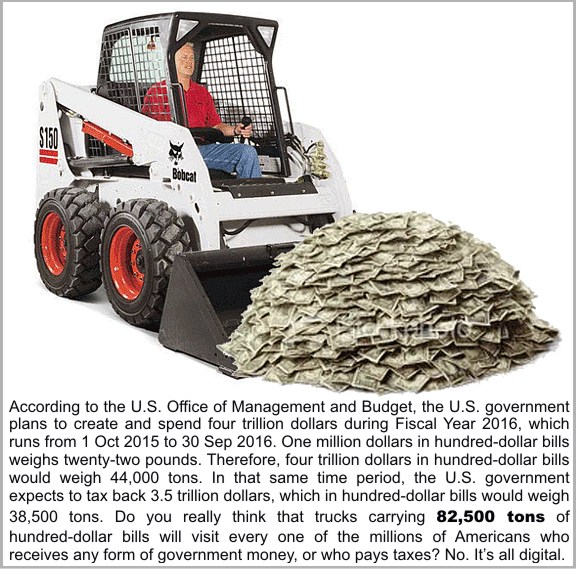
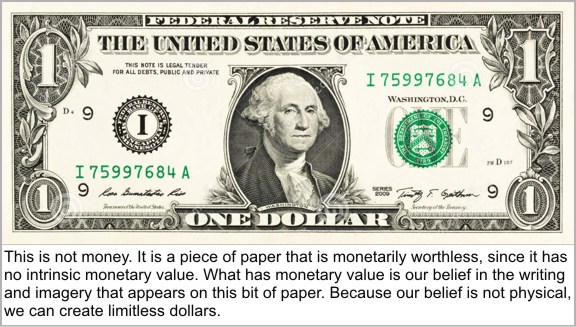
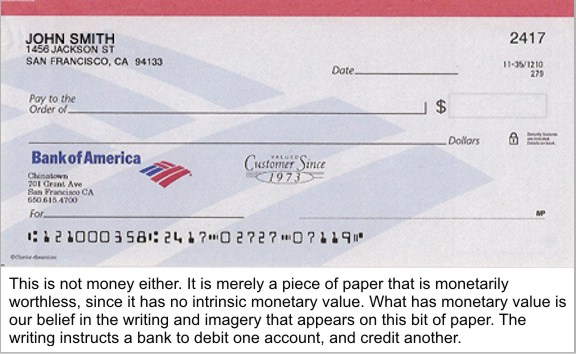

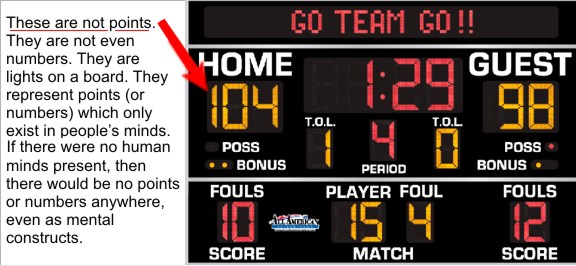

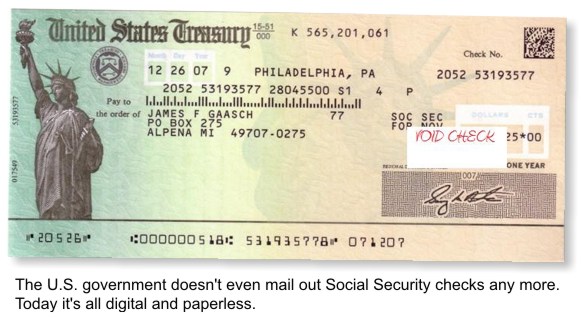
When you write a tax check to the U.S. government, the check instructs your bank to debit your account by the amount of the check, and to credit the U.S. Treasury’s account by the same amount. But since money is not physical, and can be created ad infinitum by the U.S. government (like points on a scoreboard) the U.S. Treasury has no need or use for your money. Your bank account is debited, and the IRS (which is part of the Treasury) acknowledges it. Where did your money go? It went to the same place that scoreboard points go to when we debit a scoreboard: nowhere. It was destroyed. Nothing physical moved. The U.S. Treasury’s word for this is that the tax revenues were “cleared.”
Some people cling to their delusion that money is physical by talking about “digital electrons.” This is silly. (Moreover electrons — unlike protons and neutrons — have no physical existence. We speak of electrons and light-photons as “particles” for mere convenience.)
Other people cling to their delusion by claiming that when you write a federal tax check, your money “goes” to a U.S. Treasury Tax and Loan account. However TT&L accounts are mere digital receipts (or records) of tax payments that are maintained by certain banks. TT&L accounts are also used to track and account for the “dispersal” of some forms of Treasury “funds.”
The words “dispersal” and “funds” are in scare-quotes because – again — money is not physical. Nothing moves physically. We just change the numbers.
TT&L accounts are mainly used to manage bank reserves when banks want to settle payments with the U.S. government. These reserves are a special form of currency, but they are technically not money, since reserves cannot be spent in society as money. Instead, bank reserves are a secondary points system.
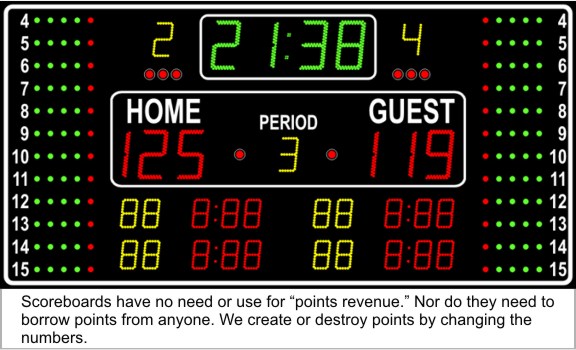
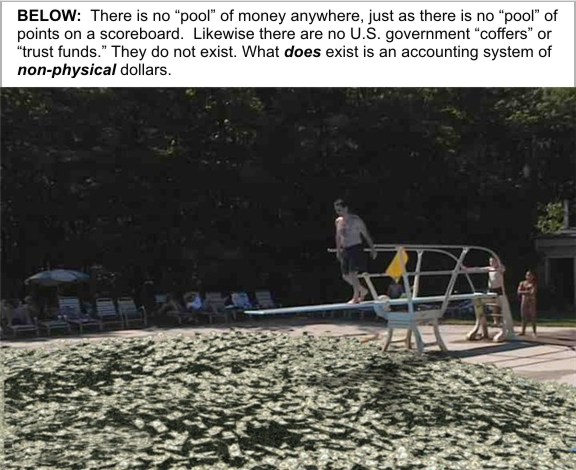

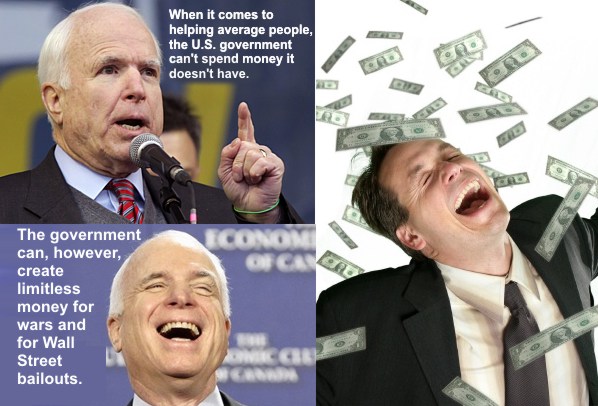
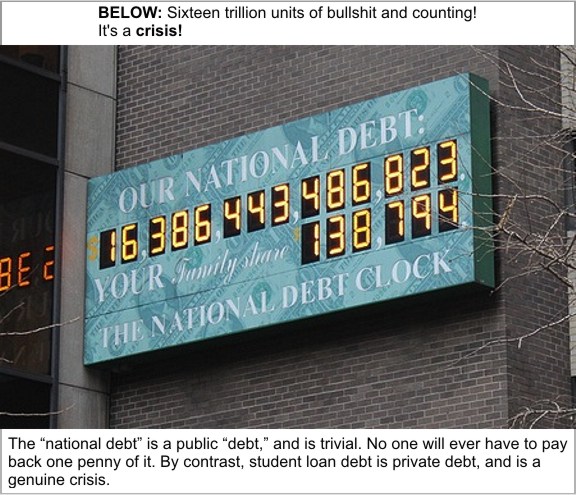
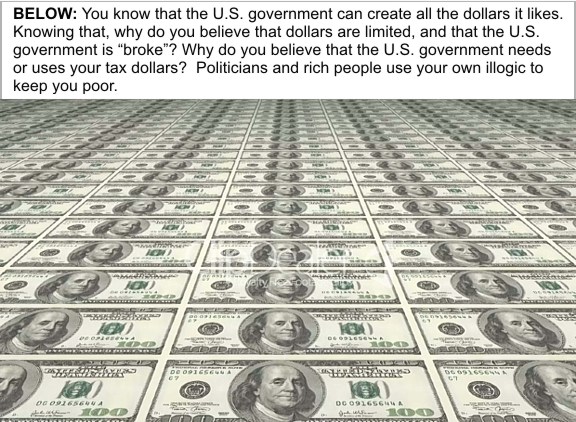

Reader “Smerls” says that, “MS theory is basically national accounting masquerading as economics.”
Physicists use the word “economy” when they speak of energy. Economists study the flow of human and non-human energy and resources. Money is simply an accounting system for this flow. A dollar is a unit of account. Monetary Sovereignty explains how the accounting system really works.
Reader “Smerls” says, “I have had many discussions regarding these statements with a number of MS/MMT folks in the past and no one has provided proof or at least a reasonable explanation why these statement would be true. The best they could come up with is that it is simply accounting semantics.”
All economics, indeed all discussions of money, are essentially “accounting semantics.” When a politician or media pundit falsely claims that “Social Security is insolvent,” the word “insolvent” is an accounting term. So are terms like “funding,” “bankrupt,” “interest,” “expenses,” “deficit,” “balanced budget,” money,” “receipts,” “revenue,” and so on. These are all accounting terms, regardless of who speaks them. Accounting is a crucial and indispensable fact of all human endeavors. However there are correct forms of accounting, and there are other forms used by liars for their own gain at your expense.
Reader “Smerls” says that, “I do respect MS and do find it useful, but with a number of flaws on a number of levels. Statements like these are to me why most people ‘don’t get’ MS.”
If there are any “flaws,” they are weaknesses of explanation. As a theory, Monetary Sovereignty deals in facts, and is therefore as sound as is the theory of thermodynamics, or hydrodynamics.
Why don’t people “get” Monetary Sovereignty? Because of hate and habit. People who are not rich are financially insecure. (Many are in abject suffering.) Most people try to reduce their mental insecurity by hating everyone who is below them on the scale of wealth, income, and power. (“At least I’m not as worthless as that bastard.”)
I call this phenomenon “Gap dynamics,” and it is simply a rehashing of Rodger Mitchell’s teachings.
Hatred-of-those-below becomes a deeply ingrained habit that rules most people their whole lives. If you are not rich, then your hatred (caused by your insecurity) makes you believe lies such as “The U.S. government is broke.” You believe this lie so you can point to those below you and call them parasites. However this same lie lets people above you to call you a parasite, and to keep you starving. Wherever you are on the social ladder, you tend to think of yourself and everyone above you as “makers,” while you think of everyone below you as “takers.” This delusion is a product and a creator of hate, selfishness, and insecurity. Monetary Sovereignty debunks all the lies that sustain this delusion and human suffering. People who reject the facts of Monetary Sovereignty are those who habitually cling to the lies that sustain their hate.
“Federal tax revenues are destroyed upon receipt? Ridiculous!”
“Why do you think it’s ridiculous?”
“Because it just is. Besides, most people agree with me.”
Once a person is habituated, he can only break out of his habit by having a sincere desire to fully understand something. This desire must be charitable (or at least neutral) and not simply a desire to refine one’s hateful delusions. Developing this charitable desire is always a matter of choice (i.e. free will). No one can create it in us.
Reader “Smerls” is an example of someone who has made the choice to sincerely and positively try to understand, but “Smerls” has not been given enough help by MMT people. I blame this on the MMT people. They tend to be academics who chatter with each other in an academic bubble — which is why no one hears them outside their bubble, and also why they never notice or correct their errors, such as “taxes drive money.”
As I noted above, I myself do not read MMT blogs. They are too annoying.


The viability of a nation’s currency depends on the “full faith and credit” worthiness of the national government. When a government wrote the currency creation laws, it wrote into existence that taxes be paid only in that nation’s currency. With the digital revolution even cash is becoming unacceptable. That’s where tax gets its spine.
Just the same your article is the first I have seen saying what the government actually does do with the tax revenue it receives. But there are lots of questions and I believe different countries do things differently although all to the same end. In the UK your tax payments are made to an account with the number 000000!
Warren Mosler said the accounts are Treasury accounts, but what happens then is not explained, except your saying they are “Cleared”, which I gather means marked down to zero[?] Just as the CB can mark up accounts to spend, they can mark down to destroy. It’s quite a landmark to understand that. The government itself is not very forthcoming and central bankers learn to obfuscate, as Greenspan has admitted.
I don’t blame MMT people like you do. First off MMT represents a description of what actually happens with macroeconomics and just as we have difficulty getting our heads around economics in general there’s no law that says getting one’s head around MMT is any easier. Just because it’s rational doesn’t mean everyone is rational and I would add your attitude is irrational as well. Making mistakes doesn’t invalidate it but it can add to the confusion. I’ve spent an enormous amount of effort trying to get my head around it, over 2 years in fact and it’s still not all clear.
It’s a worthy battle. It doesn’t need infighting as it only divides us and slows acceptance.
LikeLike
Thanks for your comments John. My comments were addressed to the MMT people who claim that federal “taxes drive money.” That is erroneous. Many countries have no income tax or capital gains tax, and they have no problems with their sovereign currencies. If there were no federal taxes in Australia, would you stop wanting Australian dollars? Of course not.
“Just the same your article is the first I have seen saying what the government actually does do with the tax revenue it receives.”
Yes. The government does nothing with them.
“But there are lots of questions and I believe different countries do things differently although all to the same end.”
The euro-zone governments actually need tax revenue, since their governments can no longer create spending money out of thin air. All non-Monetarily Sovereign entities need some kind of income from outside themselves if they are to survive.
“In the UK your tax payments are made to an account with the number 000000!”
Yes, I believe that tax revenues are collected (and destroyed) by the Exchequer, which is a division of the British Treasury (just as the Internal Revenue Service is a division of the U.S. Treasury).
“Warren Mosler said the accounts are Treasury accounts, but what happens then is not explained, except your saying they are “Cleared”, which I gather means marked down to zero.[?]
Yes, that is my understanding.
“Just as the CB can mark-up accounts to spend, they can mark down to destroy. It’s quite a landmark to understand that.”
Central banks don’t “spend” per se. They borrow and lend, and pay interest, and they also shift around “reserves,” which are not money in the ordinary sense. Reserves cannot be spent. Banks create loan money by “marking up” accounts. Loan money is destroyed by the process of paying back the loan. Monetarily Sovereign governments also create money by “marking up” accounts. Government money is destroyed via taxation.
“The government itself is not very forthcoming and central bankers learn to obfuscate, as Greenspan has admitted.”
They do this to make you grovel before them.
“I don’t blame MMT people like you do.”
I think their approach is too academic and low key. Worst of all they have no understanding of “Gap dynamics.” And they don’t put enough thought into why people resist MMT. But that’s just my opinion.
“First off MMT represents a description of what actually happens with macroeconomics and just as we have difficulty getting our heads around economics in general there’s no law that says getting one’s head around MMT is any easier. Just because it’s rational doesn’t mean everyone is rational and I would add your attitude is irrational as well. Making mistakes doesn’t invalidate it but it can add to the confusion. I’ve spent an enormous amount of effort trying to get my head around it, over 2 years in fact and it’s still not all clear.”
That’s their fault, not yours. MMT people are academicians, and as such they don’t know how to communicate effectively.
“It’s a worthy battle. It doesn’t need infighting as it only divides us and slows acceptance.”
There’s no infighting. Whenever I have commented on their blogs, they have deleted me. So I don’t go there any more. They’re in their little bubble, whereas I am out in the world, surrounded by suffering that is caused by austerity.
LikeLike
I only just discovered your reply, so a belated thanks. Can you name the blog sites which delete your responses? Maybe they are ones I have yet to uncover. Personally I never took any interest in economics as I am an architect now semi retired but with time on my hands to look into Money mechanics which I first saw on Wikipedia based on the Reserve bank of Chicago’s paper of 1963. It ‘s not used now because it spends a lot of time on FRL which is outdated today in banking.
It’s all quite counterintuitive, just as Relativity is. Our “common sense” doesn’t prepare us for the reality.
LikeLike
This MMT blog deletes my comments, even though I have always been courteous, and I agree with most of what they say…
http://neweconomicperspectives.org/
Then there are people who think that banks create all the money. They don’t want to hear that governments also create money. They delete my comments too. Here’s an example…
http://ellenbrown.com/
LikeLike
Here’s something I have just come upon now. It relates to secret deals gong on in the Federal reserve.
The author knows very little about MS/MMT but possibly there is some meat to this article???
What say you?
LikeLike
I appreciate your responding and even doing a whole post on this!!
The post is a great primer on the nature of modern money for folks who need.
Unfortunately like my past discussion with MS and MMT folks it does not answer the actual question posed.
Let me first say that in setting up your post you incorrectly characterize a number of my “positions”. I do not mind that you did this, in that it was helpful to set up the post for others but I just want to point that out.
For one, my frustration to the extent that I care, is with MS as much as it is with MMT folks. In fact in my experience, MMT folks have been as helpful if not more so than MS folks. In addition saying that I believe social security is insolent is another and there are others characterizations in the post I could take issue with but for our purposes now that is not important.
In addressing the question posed, if I understood you correctly and if not I apologize in advance, you made a couple of points which really do not address the question.
If I may summarize…
You first mention that money is electronic like a scoreboard. That when the government debits or credits an account it does not physically move money around… so it goes no where. As you say, when the government credits an account it just marks it up or adds digits/points and when it taxes it removes points, which by the way is something we all do. I agree and I agree with the notion that taxes remove, not destroy but removes money from the economy!!
Interestingly at this point you throw in the word “destroyed/destroys”. You use this word because points are removed, in essence they are being “destroyed”, which I do not necessary disagree with but there is a bit more to the story you leaving out…or…
You do continue and clarify by saying that although money is “destroyed” the government does keep track of the money ie..keeps an account ie..think accounting… but you do add that this is mostly to acknowledge the receipt of the money or at least I think that is what you are saying because…
You go on by saying that when the government taxes it debits the tax payer account and credits its own account but because money did not go anywhere again it is “destroyed”.
You then add that when the government credits its own accounts that within the banking system this is not considered actual money or part of the money supply. Here I am not clear if you consider this as part of the process where money gets destroyed or has the money already been destroyed??.
In any case you then talk about how important accounting is, that the government does keep account of the transactions, the debits and credits and you then continue on with other matters including our mutual frustration with MMT folks and my additional frustration with MS folks.
I hope I summarized this ok, because if I did then I hope you forgive me for not seeing the logic Where the money is actually being destroyed upon receipt and if the government actually spends tax money. . the reasons I say this are the following….
First though, I think it would be helpful if you defined how you are using “destroy/destroyed”. MS/MMT often redefines common words… this is not a criticism of MS/MMT, a lot of times the redefined words are more accurate, but what is a criticism is that they do not say they are redefining those common words and just assume your aware that they are doing this and then will not translate them or refuse to work with someone who is struggling using those words.
In any case as you noted in isolation you can say that removing digits or debiting accounts does “destroy” the digits or in this case money. The problem however is that this is not happening in isolation. As the government debits my account, it is crediting its own account, it is happening as a pair not as separate transactions just like in your Bank of America example above.
That is unless you are suggesting otherwise??.. which I do not think you are then at money is not really being destroyed is it??
So just because physical money is not being moved around and because money is being removed/debited from an account which does not happen in isolation but as a pair then as I just noted taxes receipts are not really being destroyed, or at least this does not mean that the money is being destroyed in the way that you are suggesting.
If you want to say that this does not count, because the debiting/crediting is just accounting mechanism and no actual money, physical money, is being moved around then I am sorry but that is just wrong…. this is the whole point of accounting, which you agree is important and it is why the government keeps track of the debits/credits and not just as a thank you for paying your taxes.
However when you talk about the governments accounts not being considered money within the banking system, this does have a bit of merit but even this involves a bit of semantics.
From my understanding and again, I am always ready to be corrected, what is actually happening and I am simplifying this to an extreme and using common terms not MS terms but what is happening is the money in the government accounts is not being counted against reserves in the banking system that is it is not being counted as part of the money supply.
Whether not being counted is the same as “being destroyed” well again I don’t think so, not being counted is not the same as being destroyed.
In any case the question then becomes if it is not being counted as part of the money supply/ part of the reserves (a banks reserves can be spent, but if it is a bank then must borrow to replace them, same is true with the federal reserves…again I am oversimplifying this) is the money in the governments account available for it to spend or said another way does the government spend the money it debits from tax payers accounts.
The answer to this is yes, it does.
Again a lot of this is accounting but that is what accounting is for??
That is when I pay my taxes the government debits my account and even though physical money is not being moved around, my account is debited and the government account is credited. When the government spends the reverse happens. The governments accounts are debited and other accounts get credited…..unless you are suggesting that is not what happens??
Again there is no actual evidence that taxes get destroyed upon receipt or that credits form paying taxes are not used to offset government spending.
Finally as you touched upon, the government can mark up an account as it wishes. It does not need to already have the credits/money in its account to mark up another account when it spends, it is never going to bounce a check as the saying goes, and I agree with this 100%!!!
In addition because it can mark up an account as much as it wants or nearly as much as it wants, that is there is point where it cannot but for all practical purposes it can mark it up as much as it wants (in which case it is mandated by law to sell bonds, if no credits from taxes are available ie running a deficit) you are correct in saying that the government does not need tax money…again I agree with this 100%…
But the question is what does this have to do with whether the government spends or destroys tax money…and the answer is nothing, it is irrelevant, unless of course you want to change the laws or do anyway with taxes which is another issue altogether!!
So unless you can correct where I am going wrong which I welcome, then this does not really address the question posed and does not really prove or show that taxes are destroyed.
Again I apologize if I misstated any of your positions, and I apologize for the long post!
LikeLike
Thank you for your questions.
When the federal government creates money, or when we add points to an electronic scoreboard, where do the money / points come from? Nowhere.
When the federal government taxes money, or when we subtract points from an electronic scoreboard, where do the money / points go to? Nowhere. They cease to exist. They are “destroyed.”
If the U.S. government can create money as easily as creating points on an electronic scoreboard, then the U.S. government has no need or use for tax revenue.
Contrary to your opinion, no physical money moves around, since, as I have explained, money is not physical. Nor are points on a scoreboard physical. Nor are numbers or words or other mental concepts. (Currency notes are not, technically speaking, money.)
Of course, the real issue here is that government money is not limited. Therefore austerity is entirely gratuitous. Rich people and their puppet politicians are intentionally starving us, in order to widen the Gap between them and us.
LikeLike
Thank you again for responding!!
I know my comment was very long and I wrote it for me late at night so it not have been totally clear, which is also why I do not have my own blog, so I understand when you say that “Contrary to your opinion, no physical money moves around, since, as I have explained, money is not physical.” So Let me be clear now …that is not my opinion, in fact I do agree with you, no actual money moves around.
At this point let me cut to the chase if you will….when I pay taxes and my account gets debited does the government’s account also get credited for the same amount??
If so how can this be considered “destroying” money??
Before getting into other issues, ie..what happens at the federal reserves or if the goverments needs my tax dollars, I would appreciate it if you would answer these questions…since this seems to get at the heart of why your saying tax dollars are destroyed.
However to continue Let me give you an example…say we have our own economy and we use electronic money and keep track of it using an electronic scoreboard. Say you have $8 dollars/points and I have $2/points for a total of $10 points in our economy.
Now say $1 point gets debited from my account but not credited to yours. We can then say $1 dollar has been destroyed.
However if we trade and $1 point gets debited from my account and $1 gets credited to your account, although the numbers change, technically you are correct no money really went anywhere, one account got marked up and another marked down but yet the total is the same.
Unless you are saying the governments accounts do not get credited, then even though technically no money went anywhere and one account get marked up and another gets marked down can you really then say that money got destroyed, which unless I misunderstand is basically what you and MS is saying?? or at least is part of what you are saying..there is also what happens at the federal reserves but is another part of this…..
LikeLike
Let’s see if I can clear this up. If not, then I invite you to keep chewing on this matter with me until we get it right.
When you pay a federal tax, your account is debited. The numbers are changed. Does your money simply disappear like points on a scoreboard? Is your money “destroyed”? Yes, in the sense that most of it stops being “money” — but let’s be careful here. The devil is in the details.
When the bank debits your account to pay a tax, the bank credits a Treasury Tax and Loan account (TT&L) at the same bank, or at some other bank. About 9,000 banks have TT&L accounts. (Personal income taxes involve a special kind of TT&L account, which I will discuss below.)
For a bank to have a TT&L account, the bank must file an application with the U.S. Treasury, and the bank must have collateral to cover any account at the bank that exceeds the $250,000 limit set by the FDIC. If the bank is a credit union, then in order to have a TT&L account, the bank must have collateral to cover any account at the credit union that exceeds the $250,000 limit set by the National Credit Union Share Insurance Fund.
The purpose of all this is to regulate the banks, and to keep banks from going too wild. (The big bankers bribed politicians to repeal Glass-Steagall, so the bankers could get around the regulations.)
When a TT&L account is credited, your money ceases to be spendable money, and becomes bank reserves. “Reserves” are a secondary system that is used to (a) stabilize the financial markets by reducing uncertainty about the supply of reserves in the banking system and (b) simplify the Fed’s implementation of monetary policy.
By (b) I mean the Fed does not tell banks what to do with their money, so much as give banks directives regarding the banks’ reserve requirements. (Remember: reserves are not “money” in the usual sense, since reserves cannot be spent). These reserve requirements can limit the amount of regular money that a bank can create as loans. For example, the Fed can tell a bank that, “You can only lend money that is equivalent to half of your reserves.” The bank can get more reserves by borrowing money from the Fed, but the Fed has limits and guidelines for that too.
So let’s retrace our steps…
[1] You write a federal tax check to the IRS. Corporate income taxes are paid on a quarterly basis. (The federal government also collects excise taxes, estate taxes, customs duties, interest from government accounts at the Fed –called “earnings on deposits” — and so on.) With FICA taxes, your employer withholds money from your paycheck, and your tax check is automatically “written” for you every time you get a paycheck.
[2] In the case of non-FICA taxes, the IRS sends instructions to your bank to debit your personal account by the amount of the check, and to credit a TT&L account at your bank, or at some other bank.
[3] When that happens, your money ceases to be money, and becomes reserves. Why? Because if trillions in tax money went directly into regular bank accounts, and remained spendable money, it could disrupt the banking system. With TT&L accounts, the money can stay in the banking system (including the Fed) while not actually being “money.”
[4] The TT&L is in turn debited, and a U.S. Treasury account is credited at the Federal Reserve.
[5] Depending on the Fed’s and the Treasury’s needs, some of the reserves may be zeroed out (mathematically destroyed).
How long does your tax money (which has now become “reserves”) sit in a TT&L account before the reserves are forwarded to the U.S. Treasury account at the Fed? If your tax payment is made electronically to a TT&L account, then by federal law the money must be forwarded (as reserves) to the U.S. Treasury’s account the same day your own account was debited, and the TT&L account was credited. (Federal law requires companies with tax payments of over $200,000 per year to send in their taxes electronically.)
NOTE: Personal (i.e. individual) income taxes involve special circumstances. With personal income taxes…
[1] You write a check to the IRS.
[2] The IRS instructs your bank to debit your account, and to credit special TT&L accounts at 160 “lockbox” commercial banks nationwide, which will take in about $1.6 billion in FY 2016.
Depending on the U.S. Treasury’s wishes, your tax money will be forwarded to the Treasury’s account at the Fed as reserves, or sometimes as actual money to the Treasury’s account at the Fed Bank in New York. In the latter case, tax money is NOT “destroyed upon receipt.” Instead, the Treasury can use it to fund some government operations. The Treasury could simply create that money out of thin air, but by first taking it out of the economy, the Treasury avoids causing possible inflation.
So in one sense tax monies are not “destroyed” upon receipt” but are (mostly) transformed into reserves, which may be retained or destroyed as the Fed and the Treasury see fit. In another sense, tax monies are indeed “destroyed upon receipt,’ since reserves are not “money.”
It’s all a game of moving numbers from one part of a balance sheet to another, and then another. The main point is that the U.S. government is not “broke,” Social Security is not “insolvent,” and the U.S. government does not run on loans or tax revenue.
Therefore the U.S. government “has no need or use for tax revenue” as INCOME, but the government does use tax revenue as RESERVES to help regulate and stabilize the banking system, and to help control inflation in the overall economy.
(I should have been clearer on that before.)
Does that help any?
LikeLiked by 1 person
By saying that Treasury “can use it to fund some government operations” says that not all money spent by the Federal government is created new money? Yes?
Related to that the Feds collect some state taxes on their behalf and then divert the states tax receipts to the states.
What do you know about that/
In an earlier post you used the term “cleared” relating to tax amounts held in Treasury. Does that not mean set to zero?
Thanks.
Good to see some of the actual mechanics of modern fiat money.
I’ve not seen what happens up until now.
Also;
I have been assured by a banker here in Aus that Client Money Rules applies to banks now. Previously it didn’t. What’s the US position?
LikeLike
Q. By saying that Treasury “can use it to fund some government operations” says that not all money spent by the Federal government is created new money? Yes?
A. Yes, but we never know how much is new, since politicians and bureaucrats in all nations are never honest about the federal budget.
The Australian government’s fiscal year runs from July 1st to June 30th of the following year. The U.S. government’s fiscal year runs from October 1st until September 30th of the following year.
During FY 2016 the U.S. government expects to spend US $4 trillion, and tax back US $3.5 trillion, leaving a deficit of US $474 billion. That’s just the “on budget” spending. There are many billions more that are created and spent “off-budget,” such as funding for the endless wars. How many more billions? We are not told.
We must logically assume that during each fiscal year there is still some money in circulation from the previous year. How much? I don’t think anyone knows that. There can only be estimates. The U.S. Pentagon is notorious for being too vast and corrupt to audit. Billions of dollars simply vanish into various offshore bank accounts.
Q. Related to that the Feds collect some state taxes on their behalf and then divert the states’ tax receipts to the states. What do you know about that?
A. I have not heard about that. It is my understanding that state, county, and municipal governments collect their own taxes — but it seems reasonable to presume that the Feds are involved at some point. In 2000, the state of California alone had the world’s sixth largest economy; bigger than all of Australia’s combined. (California also had the largest number of people in poverty.) Today, California’s GDP has dropped to the 8th largest or the 12th largest (depending on who you read). Wall Street has sucked billions of dollars out of the California economy. With so much money flowing outward, it is reasonable to presume that the Feds have been involved in the game in some way. California revenues are parked in Wall Street banks. Because of interest and various other charges, everything the California state government does costs twice what it should. The result is severe austerity.
California could solve its financial problems by having a public bank like the state of North Dakota has, since banks can create loan money out of thin air, and charge little or no interest. But every time someone suggests this, Wall Street and the private bankers bribe California politicians to shoot it down.
Q. In an earlier post you used the term “cleared” relating to tax amounts held in Treasury. Does that not mean set to zero?
A. Yes. It refers to the debiting of TT&L accounts in banks. I erroneously implied that it meant “destroyed,” but the monies are transformed into reserves, and credited to the U.S. Treasury’s account at the Federal Reserve System. Reserves are technically not money. With “quantitative easing” the Federal Reserve creates $45 billion a month and uses it to juice Wall Street. This is not inflationary, because that $45 billion a month is in reserves. It’s not real “money,” but, in an accounting sense, it backs up the money system.
Q. I have been assured by a banker here in Aus that Client Money Rules applies to banks now. Previously it didn’t. What’s the US position?
A. Client money rules are supposed to ensure a clear separation between money that belongs to the customer and money that belongs to the bank or the financial firm. However the U.S. bankers have bribed politicians to so decriminalize the bankers that it’s questionable whether there are any client rules at all in the USA. Hence we hear ominous rumors about potential “bail-ins,” in which the bankers steal customer deposits to cover the banker’s bad bets. I don’t know how much of those rumors are true. The bankers could simply be making threats to ensure that bailout money keeps coming from the U.S. government. There are also rumors about the bankers preparing to charge negative interest, in which they charge you to deposit your money with them.
See this
http://www.truth-out.org/news/item/33757-hang-onto-your-wallets-negative-interest-the-war-on-cash-and-the-10-trillion-bail-in
LikeLike
Is there some “Official Document”. like from one of the Reserve Banks which sets out the path of tax money through the system? The Bank of England publishes quite often, but I don’t know if they have one on this path. The Dallas Fed has one on Shadow Banking, for example. There should be something out there.
it’s not thay I think you are wrong, but the need to quote some “authority” is more easily believed by Joe Public.
BTW. I wouldn’t class Ellen Brown as an MMT supporter. She might be on the fringes, but Warren Mosler is quite scathing about her work.
LikeLike
Q. Is there some “Official Document” like from one of the Reserve Banks which sets out the path of tax money through the system?
A. Below is an example of one. There are twelve regional Federal Reserve banks in the USA. The most important and powerful is the Fed Bank of New York. This is an official document from them…
https://www.newyorkfed.org/aboutthefed/fedpoint/fed21.html
Q. BTW. I wouldn’t class Ellen Brown as an MMT supporter. She might be on the fringes, but Warren Mosler is quite scathing about her work.
A. Ellen Brown is an MMT opponent, since she erroneously insists that all money is created as bank loans. For her, government spending is government borrowing. It was her I had in mind when I wrote this post…
and this post…
Ellen and I used to communicate all the time, until I was “poisoned” by MMT and by Rodger Mitchell’s teachings.
LikeLike
Gee, thank you for that link. Great to have it.
LikeLike
test!
LikeLike
This is the third time I have typed out a query, so fingers crossed! I read the NY Fed paper. It takes us to the door but beyond that is not explained. You wrote that the FF&T sums are used as reserves to guarantee bank stability, meaning not spent. Rodger said all “debt” in the central bank is made up from T-Bonds. So the TT&L deposits are exchanged for bonds. But bonds mature and would go towards a private account, getting back it’s bond money. Would these particular bonds then not be like ordinary bonds since they could be sold to outsiders? That would mean all money from the CB is not necessarily new? Would their bonds be rolled over endlessly?
LikeLike
Q. You wrote that the FF&T sums are used as reserves to guarantee bank stability, meaning not spent. Rodger said all “debt” in the central bank is made up from T-Bonds. So the TT&L deposits are exchanged for bonds.
A. I don’t know what FF&T sums are. As far as all “debt” in the central banks being made up of T-securities, that is a separate matter from taxation, and from TT&L accounts.
Various forms of investors, including banks, individuals, foreign and domestic companies, and even the central government itself, purchase T-securities because the securities pay various amounts of interest. (Here in the USA, T-securities include Treasury bills, Treasury notes, Treasury bonds, and Treasury Inflation Protected Securities). T-securities are sold by the U.S. Treasury, often an auctions run by the Federal Open Market Committee, which is part of the Federal Reserve.
When you buy a T-security, it is just like buying a Certificate of Deposit from a regular bank. In exchange for letting the bank have your money for an agreed-on term, the bank (including the Federal Reserve) pays a higher rate of interest than it does on checking accounts, from which money can be withdrawn on demand. (The Fed does not offer regular checking accounts to non-government entities.)
The money that is used to buy T–securities is called a “national debt” because it is lent to the Fed in exchange for interest. Again, this is just like lending your money to any other bank. When you open any account at any type of bank, you lend your money to the bank. The greater the amount of deposits, the more the bank is in debt. However this debt is also an asset for the bank. Therefore the banks do not advertise that they are a billion dollars in debt. Instead, they boast that they have a billion dollars in deposits or assets. Banks love to be in debt, but they don’t phrase it that way.
The U.S. government creates interest for T-securities out of thin air. (Some T-securities, such as Treasury Bills, do not pay interest, but are instead sold at a discount. For example, you can buy a 100-dollar Treasury Bill for 90 dollars, and get back 100 dollars when the Treasury Bill matures.)
Again, this process is not connected with regular spending or taxation, or TT&L accounts. However politicians want the public to think that the U.S. government creates nothing out of thin air, and instead the U.S. government borrows its spending money by selling T-securities. This is a lie.
Politicians tell this lie in order to make the public grovel before them, and in order to legitimize austerity, which widens the Gap between the rich and the rest. By falsely claiming that the U.S. government has a “debt crisis,” politicians can falsely claim, for example, that Social security is “insolvent.” In this way, politicians keep the peasants begging for a few droplets of water from an inexhaustible well.
Q. So the TT&L deposits are exchanged for bonds.
A. No, I don’t think so.
Q. But bonds mature and would go towards a private account, getting back its bond money. Would these particular bonds then not be like ordinary bonds since they could be sold to outsiders? That would mean all money from the CB is not necessarily new? Would their bonds be rolled over endlessly?
A. T-securities (except for U.S. Savings Bonds) are considered highly liquid, and are “marketable,” which means that after they are purchased, the buyer can sell them on a secondary market. That is, T-securities can be traded in the financial markets where previously issued financial instruments are bought and sold, such as stocks, bonds, options, futures, and T-securities.
As far as T-securities being rolled over, this can be done if the buyer wishes. When a T-security matures, it plus its interest can be used to buy another T-security, this time for more money.
Does any of this make sense to you?
LikeLike
I have understood most of what you say about bonds, But I’ll have to get back in a few days as I’m away till then.Regards
LikeLike
No problem. It’s 5:27 am where you are. I admire your tenacity. 🙂
LikeLike
Hi,
I am not sure if you are in the U.S. or not but if you are and you celebrate Thanksgiving I hope you had a great one!!
You say “Does that help any?”
My response…YES it does, I cannot thank you enough for taking the time to actually answer this and for your willingness to work this through until I get it…actually I had it although I did not convey it clearly but was looking for confirmation!!!
Initially I thought this might be another go around that would lead to nowhere except a lot of frustration on my end and on the part of people I was debating this with but with the followup post and your replies to John you are one of the few people who have actually explained this in a easy to understand way!!
I urge you to continue with post like this explaining how our monetary system actually works. Some MMT/MS folks are too technical and those that are not get bodged down MS/MMT terminology they end up talking past folks.
I may disagree with some of the policy recommendations as I lean more towards being a Libertarian (although I would not call myself one and I don’t think Libertarians would be call me one either) in same way MS/MMT folks may disagree with Jobs guarantee proposals but as far as explaining how the system works I cannot agree more with what you have written so far.
Also this does confirm my understanding from what I have been able to dig up that tax money does not get destroyed in terms of the common meaning of being destroyed but it is not added to the money supply either (which if I have been mistakenly saying is not added to reserves when I meant the money supply) and is not used by the banking system in the same way as when you and I deposit money in our baking accounts.
So when MS/MMT folks say that the government does not spend tax money, if flat out saying this statement is wrong is a bit too strong of an accusation then at least it is not wrong to say that the statement is not totally accurate and there is more to the story.
In any case for the life of me I do not understand why when I called MS/MMT folks out when the make this statement I get such an argument on it. Folks would use the scoreboard analogy and when I questioned on it they would move on to saying the government does not need your tax money (so somehow they want to make the jump to this meaning the government does not spend tax money it does receive..) and so forth until they ran out of “explanations” and then they would finally threaten to ban my comments.
But they would never explain it like you just did or admit that there is more to the story and I just don’t get it. It is not like it would invalidate everything else they were saying or the whole idea of MS/MMT but if they stopped making that statement or at least explained it better when challenged it would help better make their points and people (at least some people) not familiar with MS/MMT may have less trouble believing it or understanding it .
In any case I just want to thank you again!!!
LikeLike
Q. So when MS/MMT folks say that the government does not spend tax money, if flat out saying this statement is wrong is a bit too strong of an accusation then at least it is not wrong to say that the statement is not totally accurate and there is more to the story.
A. We must be very careful in our wording.
MMT people, for example, routinely use words that confuse readers, such “government debt.” I myself simply refer to T-securities. Money that was used to buy T-securities is on loan to the Fed (just as all deposits in all banks are on loan to the banks) but it has no effect on the U.S. government’s ability to create money.
The basic point (and MMT people are 100% correct in this) is that a money creator (e.g. the U.S, government) is not the same as a money user (e.g. you and me).
Another basic point is that people who espouse the “credit theory” of money are in error when they claim that all money (including government-created money) consists of bank loans.
Nothing – NOTHING – can shake them out of their trance.
LikeLike
Elizabeth, following up your answer to me last Friday, I still am in the dark about what path through the CB and Treasury the tax revenue takes. The TT&L accounts take us to the door, as it were, but I’m barely any wiser re what happens next.
I am still trying to get clear on what happens with Treasuries and reserves in the CB. Treasuries are savings accounts for outsiders, earning interest in CB savings accounts. That I get. From what you say reserves are something else also kept in Treasury[?] accounts held at the CB, not savings accounts[?] Why would a MS government want reserves? They need no savings or loans,ever. So the reserves must be like bonds but with a different purpose, such as to regulate bank capital – I though that already happened with Treasuries[?]
Maybe they are on the liability side of the balance sheet, not assets like Treasuries? I have seen that reserves earn no interest and are in effect a tax on commercial banks reserves. Is this all in response to one or other Basel accord? How would the balances work out with tax revenue entering the equation. They are not possibly commercial bank reserves. So why does a government have them???
LikeLike
Let me write a blog post about that.
LikeLike
I did have one follow up. In your reply comment under # 5 you wrote
” [5] Depending on the Fed’s and the Treasury’s needs, some of the reserves may be zeroed out (mathematically destroyed). ”
I just want to clarify that this would include federal reserve operations… in general terms that would encompass in terms of their balance sheet when they buy/sell t- securities, when they set reserve requirements for banks, when they adjust interest rates and undergo quantitative easing and so forth ..is that correct…I am not talking about specifically what happens but just in general terms…if that makes sense at all??
Also as a followup when the government runs a surplus, for as long as it runs a surplus then it would be correct to say that money is actually being destroyed??
That is In a rare case that there is actual surplus then money being sent to the government, at least the surplus amount (once all the accounting is done, and if government does not do anything the surplus amount) is not being re-spent into the economy. Also depending on what the feds does, it is not being counted as money and may actually be destroyed or taken off the feds books, it is correct in this case to say that it is being destroyed, or am I wrong here??
Thanks!!
LikeLike
Q. I just want to clarify that this would include federal reserve operations… in general terms that would encompass in terms of their balance sheet when they buy/sell t- securities, when they set reserve requirements for banks, when they adjust interest rates and undergo quantitative easing and so forth ..is that correct…I am not talking about specifically what happens but just in general terms…if that makes sense at all?
A. Yes that is correct.
Q. Also as a follow-up when the government runs a surplus, for as long as it runs a surplus then it would be correct to say that money is actually being destroyed?
A. Yes, but some amount of money is destroyed even without a surplus. It’s a big balance sheet with endless numbers occupying countless boxes. Some of these numbers (i.e. money) get moved from one box to another. Other numbers are simply zeroed out (i.e. destroyed), and replaced by new numbers the following fiscal year (or whenever). Which is which? We can’t be precise, since we aren’t told all the details of Fed and Treasury operations.
The main thing is that money is not physical, and the U.S. government can no more become “broke” that an Excel spreadsheet can run out of numbers. And Social Security can no more become “insolvent” than an electronic scoreboard can become points-insolvent.
Everyone knows this, and yet everyone pretends he doesn’t know it. A person claims that the U.S. government is “broke.” When you explain that the U.S. government can create all the dollars it likes, he falls back to “Plan B” which is to claim, “But without austerity we’d have hyper-inflation.” For such people, our choice is between a depression or hyper-inflation. This view is nonsense.
LikeLike
Each year, the Fed remits too the US Treasury its net income, and thus provides the federal government with an important source of funding.
Where does this go to—does it go the TT&L
LikeLike
Thanks for the question. I apologize for not responding sooner, but these last two months have been an personal ordeal for me. I won’t bore you with the lurid details.
Q. “Each year, the Fed remits to the US Treasury its net income, and thus provides the federal government with an important source of funding. Where does this go to—does it go the TT&L?”
A. To begin with, the U.S. government needs no source of funding, since the federal government creates all its spending money out of thin air, simply by crediting bank accounts. (By contrast, state, county, or municipal governments do need funding, since they cannot create dollars out of thin air.)
For example, if Lockheed Martin wants a billion dollars for an airplane, then the U.S. government instructs Lockheed Martin’s bank/s to credit Lockheed’s account/s for a billion dollars. The bank simply changes the numbers. In this way a billion dollars are created out of thin air. Nothing physical is involved in this transaction, since dollars are not physical. Dollars are strictly mental concepts, like the number “10” or “ten trillion,” or like points on a sports scoreboard.
Regarding the Federal Reserve, the Fed does not have an “income” in the usual sense. The Fed is a depository for (non-physical) reserves. Reserve dollars cannot be spent or invested. Instead, reserve dollars just sit there as a “back-up” which supposedly stabilizes the financial system and the regular money system. As I said, reserve dollars are not physical, just as points on a scoreboard are not physical. (Scoreboard numbers represent points, but the numbers themselves are not points. Actual points, like dollars, only exist in human minds.)
The Fed gets its reserves from regular banks, from investors, and whoever else buys T-securities. These securities are just like CDs at regular banks. You deposit your money in a Fed saving account for an agreed-to amount of time, in return for an agreed-to rate of interest. Your money cannot be spent while it is in a Fed savings account. It becomes part of the Fed’s reserves, which are now over $20 trillion.
BUT WAIT. What about all the books and articles and so forth which say the Fed must remit its “income” to the Treasury? This is all bullshit that is designed to trick you into believing that dollars are physical, finite, and limited. If you falsely believe that federal dollars are physical and limited, then you will submit to the lies of politicians who claim that there is “no money” for Universal Medicare, for instance. (However there is infinite money for wars, for weapons makers, for corporate subsidies, for Wall Street bailouts, and so on.)
LikeLike
Before the enactment of the FAST Act, the Board of Governors required the Reserve Banks to transfer excess earnings to the Treasury as interest on Federal Reserve notes after providing for the costs of operations,
This is straight from “Board of Governors” and not from a book.
https://www.federalreserve.gov/publications/annual-report/2015-federal-reserve-banks.htm#xsubsection-110-4251557d
LikeLike